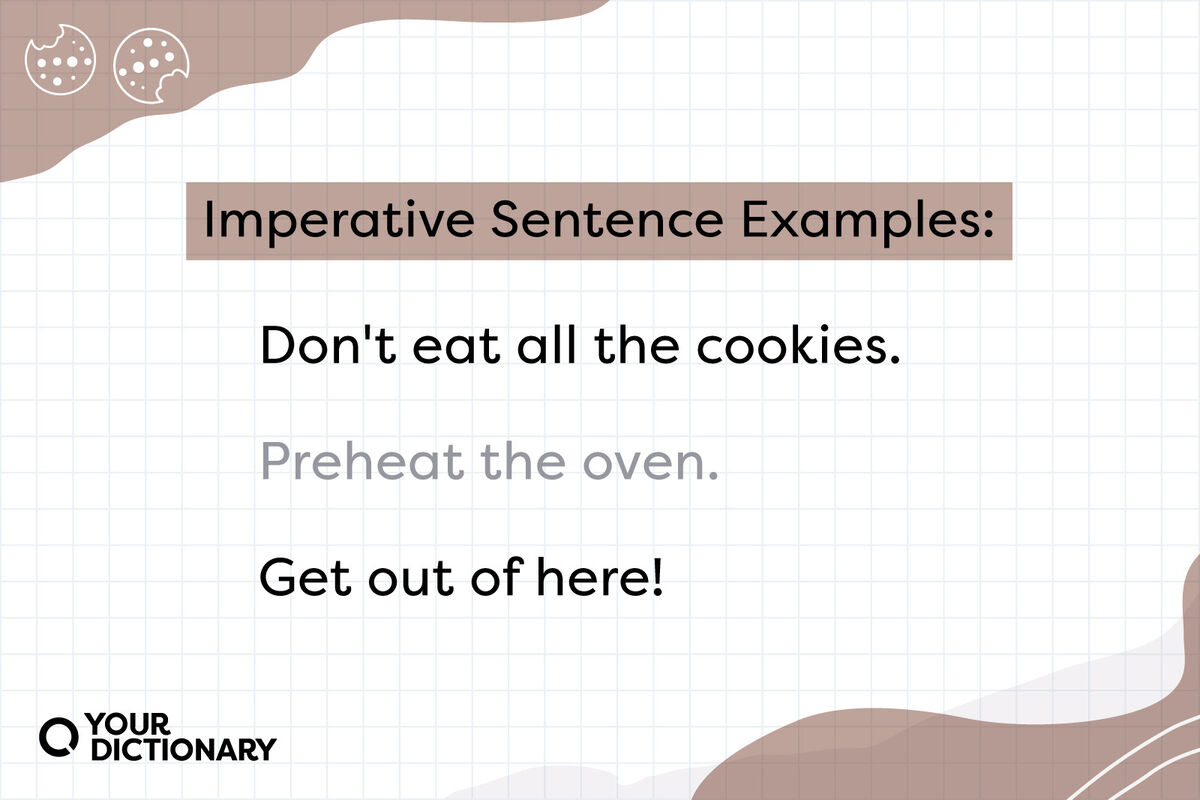
Imperative sentences are used to issue a command or instruction, make a request, or offer advice. Basically, they tell people what to do. Below, you'll find some imperative sentence examples and learn about their function.
Imperative sentences usually end with a period but can occasionally end with an exclamation point. These sentences are sometimes referred to as directives because they provide direction to whoever is being addressed.
In the examples of imperative sentences here, you'll note that each line is issuing a command of some sort:
- Pass the salt.
- Move out of my way!
- Shut the front door.
- Find my leather jacket.
- Be there at five.
- Clean your room.
- Complete these by tomorrow.
- Consider the red dress.
- Wait for me.
- Get out!
- Make sure you pack warm clothes.
- Choose Eamonn, not Seamus.
- Please be quiet.
- Be nice to your friends.
- Play ball!
- Be patient!
Identifying Imperative Sentences
The first indication of an imperative sentence is its punctuation. Most of these sentences end with a period, and sometimes an exclamation mark. Just be careful, as imperative sentences aren't the only sentences that end with a period or exclamation mark (as you’ll see below). The punctuation is simply your first indication that you may be looking at an imperative sentence.
Next, take a look at the verb in these sentences. Typically, imperative sentences begin with verbs that issue a command. Another clue is the subject. Do you see one? Generally, the subject of an imperative sentence is implied, not stated, as it is giving a direct order.
No matter what, the main function of an imperative sentence is to provide instruction, make a request or demand, or offer an invitation or advice. Let's take another look at some imperative sentences and consider their function:
- Preheat the oven. (Instruction)
- Use oil in the pan. (Instruction)
- Don't eat all the cookies. (Request or demand)
- Stop feeding the dog from the table. (Request or demand)
- Come out with us tonight. (Invitation)
- Please join us for dinner. (Invitation)
- Choose the Irish wolfhound, not the German shepherd. (Advice)
- Wear your gold necklace with that dress. (Advice)
Other Types of Sentences
Imperative sentences are one of four main types of sentences. The other three types are:
Let's take a quick look at each type of sentence and how you can tell them apart from an imperative sentence.
Declarative Sentences
Imperative and declarative sentences are sometimes confused because each of them can end with a period.
Here's the main point of difference. Declarative sentences don't issue commands, provide instructions, or offer invitations; they simply make a statement or offer an opinion. Basically, they make a declaration.
- I am traveling to Ireland. (Statement)
- Ireland is really beautiful. (Opinion)
Exclamatory Sentences
An exclamatory sentence expresses heightened emotion such as excitement, surprise, anger, or joy. It always ends with an exclamation mark.
As an imperative sentence can also end with an exclamation mark, you have to ask yourself if the sentence is issuing a command (imperative) or expressing a feeling (exclamatory). For example:
- Get out of here! (Imperative sentence)
- I wish he would leave! (Exclamatory sentence)
Interrogative Sentences
An interrogative sentence actually asks a question. These sentences end with a question mark and often begin with such words as who, what, where, when, why, how, or do.
- When will your short story be finished?
- Do you still have my book?
Imperative Power
When issuing a command or instruction, know that you're in an imperative state of mind. Anything else would be classified as declarative, interrogative, or exclamatory. As you move forward in your reading and writing, have fun classifying each new sentence you come upon!